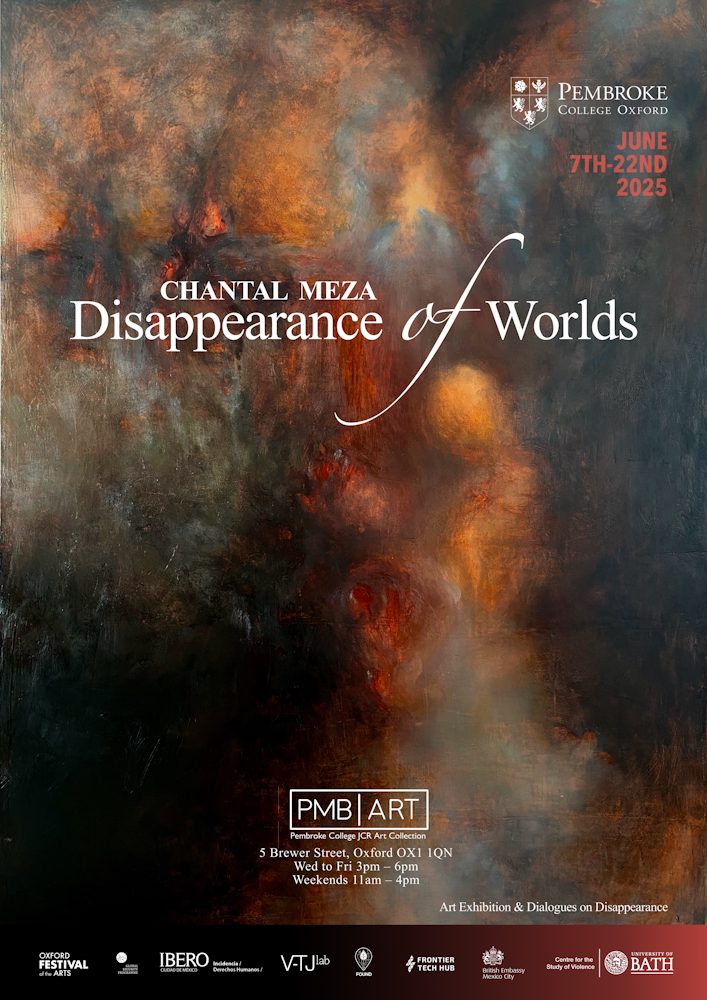Chantal Meza’s work continues to explore the darker aspects of a global society, from war to ecological disaster, her paintings are a conduit of that darkness but also a way forward through discussion. Will Gompertz has reputation as insightful writer and interviewer so the discourse around the exhibition is sure to raise questions worth considering.

Press Release: Oxford Exhibition sheds light on the darkness of disappearance
In a year that has marked the 80th anniversary of the liberation of Bergen-Belsen, which provided the surest evidence of the first systematic attempt to disappear an entire people from the face of the earth, across the planet stories continue to proliferate on the forced disappearance of human life. This includes the forced abduction of people from the streets, including journalists, to the ongoing discovery of mass clandestine graves and extermination camps.
This comes at a time when we are witness to the ongoing destruction of the world’s biosphere, while once cherished claims to freedom, justice and truth appear to be vanishing before our eyes. Emboldened forms of authoritarianism are using the latest technologies to erase ideas and peoples.
Yet if spectacles of violence are difficult to come to terms with, the terror of a forced absence poses an entirely different set of problems. It takes us beyond what can be seen and known with any degree of certainty. It taps into our most primal of fears: to disappear without a trace.
The acclaimed Mexican painter Chantal Meza has been countering the terror of disappearance for near a decade and will be bringing her latest collection of paintings to Oxford this summer. Titled Disappearance of Worlds, Meza’s evocative abstract works address the multiple forms disappearance takes and asks us to consider what role art can play in response to such atrocities.
When commenting on the exhibition the artist explains, ‘It is a real honour for me to showcase these works in the beautiful city of Oxford, which is also importantly a sanctuary city providing refuge to so many who are fleeing the possibility of being vanished. For art to be meaningful, I truly believe it needs to confront the intolerable. Art can breathe life into a new kind of poetic imagination, which can lead to a more engaged conversation at an all too human level, allowing us all to speak to the most pressing concerns’.

Disappearance of Worldswill be held in the Pembroke College JCR Art Gallery, part of the University of Oxford. Operations Bursar at Pembroke, Vanessa Gouws, who first made contact with the artist last year, shares: ‘our core purpose as a College is to serve the common good through education and research, and we feel a responsibility to respond to real-world challenges like this. This project is a wonderful example of the kind of interdisciplinary collaboration and conversation which we believe is so key to finding solutions to those challenges. It is a real honour to welcome Chantal Meza and her collection and to hear throughout the month both from those affected by and those responding to the problem.’
Complementing the exhibition, a suite of public talks will run throughout June to address the multiple forms disappearance takes. A notable event will be a conversation between Indira Navarro, the leader of the searching mothers collective Guerreros Buscadores de Jalisco’, and Oxford researcher Miguel Moctezuma. Indira has been leading the search following the recent discovery of an extermination camp in her home state of Guadalajara. Further testimonies will be provided by Lizet & Carmen Cardona from Corazones Robados Searching Mothers’ Collective, along with discussions from Gareth Owen, former Humanitarian Director of Save the Children; Phil Scraton, renowned campaigner and Professor, Queens University Belfast; and incoming co-director for Asylum Welcome, Hari Reed and Baroness Jan Royall, Principal of Somerville College, Oxford invited by Dr Michelle Castelletti, the director of the Oxford Festival of the Arts.
Disappearance of Worlds will open on the evening of 6th June with a ticketed event featuring a conversation between Chantal Meza and noted art critic and journalist Will Gompertz, also invited by the Oxford Festival of Arts, an official partner of the exhibition, as well as senior representatives from the International Committee of the Red Cross and many Oxford dignitaries and associates.
‘In this dark moment when the world is facing so many uncertainties’, Castelletti observes, ‘many people are wondering what the role and purpose for art and cultural engagement is. This exhibition is the perfect response. Art can shed a light when darkness descends. It is more necessary than ever, which is why Oxford Festival of Arts are a proud partner for this urgent exhibition within this year’s edition of the festival’.
The Disappearance of Worlds Exhibition will be open from 7th – 22nd June 2025 at Pembroke JCR Art Gallery, Pembroke College, University of Oxford. Full details on opening times and ticket reservation for events can be found here:
This project is in collaboration with Pembroke JCR Art Fund; Pembroke College, Oxford; the Centre for the Study of Violence, University of Bath; FrontierTech; The Found Project; Oxford Global Security Programme; Violence & Transitional Justice Lab, University of Notre-Dame; and the Human Rights Program, Universidad Iberoamericana, Ciudad de México.

The aim of art is to represent not the outward appearance of things, but their inward significance. – Aristotle



















